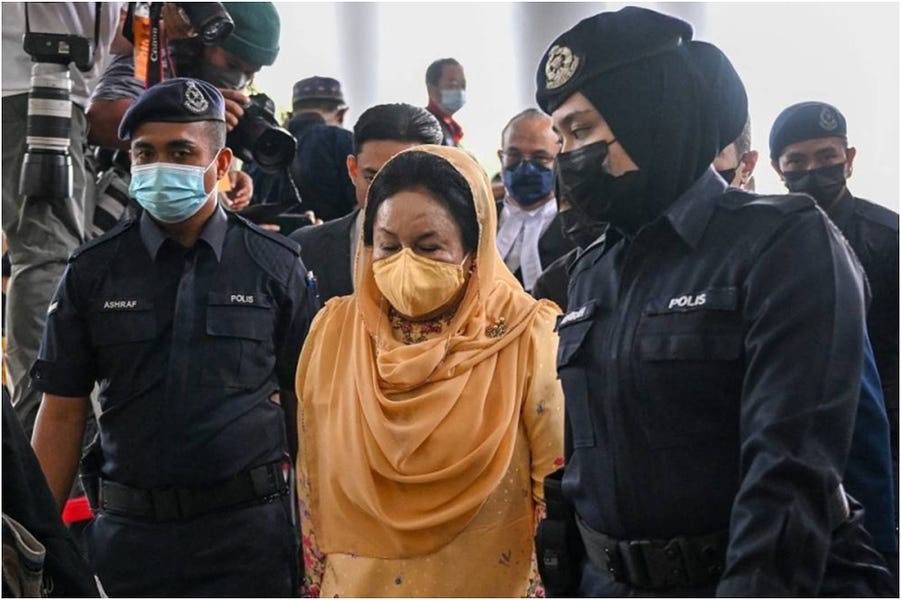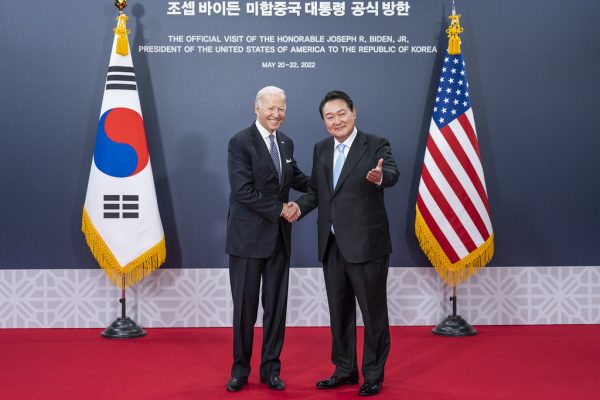The guilty verdict for former Prime Minister Najib Razak’s wife Rosmah Mansor today, September 1, is the second recent landmark corruption case before the Malaysian judiciary, one starting to resemble an assembly line of top political figures facing unaccustomed justice.
Rosmah was sentenced to a decade in prison and fined RM970 million (US$216.45 million) on three bribery charges. Like her husband, she was allowed to remain free by High Court Judge Mohamed Zaini Mazlan while she appeals her sentence. The verdict was expected after a draft copy of materials used by the court was leaked by a UK-based blogger earlier this week. The sentence is actually only expected to keep her in jail for three to four years.
“I must admit that I’m very sad with what happened today,” she was quoted as tearfully telling the judge by Reuters. “Nobody saw me taking the money, nobody saw me counting the money…. but if that’s the conclusion, I leave it to God.”
Although the 70-year-old Rosmah was convicted of taking bribes totaling about US$42 million to swing a US$280 million contract to a firm named Jepak Holdings Sdn Bhd supply solar power to schools in the east Malaysian state of Sarawak, she was widely known during her husband’s heyday as prime minister to be a go-to source for approvals for contracts, land acquisitions and a wide range of government actions.
Rosmah’s influence inside the government helped her to amass a huge amount of swag that was confiscated by authorities in the wake of the 2018 national election, when the Barisan Nasional fell from power. How much remains in unknown accounts overseas is undetermined.
On August 23, refusing to buckle to political pressure, the Federal Court, headed by Chief Justice Tengku Maimun Tuan Mat, ordered Najib, the country’s most powerful political figure, to jail for 12 years. He faces four more trials involving the theft of billions in the fall of the government-backed 1Malaysia Development Bhd.
Lined up to meet justice behind the Najibs are the members of the so-called “court cluster” of corrupt officials who led the United Malays National Organization in a morass of corruption that led to the ouster of the Barisan Nasional in the 2018 general election. That brought the opposition Pakatan Harapan coalition to temporary power and opened the door for the appointment of Tengku Maimun, who has dramatically cleaned up the judiciary.
Next to likely face prison is UMNO President Abdul Zahid Hamidi, expected to be found guilty on 47 charges of criminal breach of trust, corruption, and money laundering charges for allegedly looting Yayasan Akalbudi, a charity foundation which he had established, seemingly for the purpose of looting it. After Zahid is expected to be Azeez Rahim, an UMNO Supreme Council member and chairman of Tabung Haji, the fund established to send Muslim pilgrims on the Haj, which he is suspected of looting.
There are other top figures in the pipeline, including Shahrir Abdul Samad, the respected former Minister of Domestic Trade and Consumer Affairs, for money laundering RM1 million from 1MDB into political contributions, making Malaysia exceptional. This is not revenge by a replacement regime. In fact, the reconstituted Barisan coalition from which the corrupted politicians emerged is back in power and seeing some of its most influential politicians facing justice.
“It is against the backdrop of political intimidation by the court cluster and their supporters that the chief justice and the others have bravely discharged their constitutional duties,” said Tommy Thomas, a former attorney general in the Pakatan Harapan government who lost his job when the opposition coalition fell. “They have acted with courage and in a principled manner. Malaysia should be very proud of these top-class judges.”
That makes Malaysia unique in Southeast Asia. It didn’t happen in Indonesia, where the Suharto family spent decades pillaging the public purse of as much as US$15–35 billion and remain influential in Jakarta today, or in the Philippines, where Ferdinand Marcos Jr was recently elected president and the rest of his rapacious family are entrenched in public office, with no apparent inclination to return any of the US$10 billion-odd that their patriarch, Ferdinand Marcos, allegedly stole during his 21 kleptocratic years in power. Thai dictator Prayuth Chan-ocha, who lost power in Bangkok last week, remains a member of the ruling junta.
And, as critics have pointed out, it isn’t just Southeast Asia. Donald Trump, ousted from a tarnished US presidency characterized by rapacious self-dealing and who appears to have attempted to foment an outright coup on January 6, 2021, remains free and is campaigning energetically for the presidency in 2024.
Former British Prime Minister Boris Johnson has been accused of redecorating his flat from funds from special interests and breaking a long series of other laws and regulations. He has most recently been spotted vacationing in Greece. Binyamin Netanyahu, the former Israeli premier, has been credibly accused of corruption but is vigorously attempting to finagle his way back to power.
The difference in Malaysia is a reformed court system led by the 63-year-old Tengku Maimun, the court’s first woman chief justice, who was appointed by Mahathir Mohamad in May 2019 during the opposition Pakatan Harapan’s short reign in power. She has played a crucial role in reforming a system whose reputation had been tarnished by years of political and commercial influence.
A career public servant, she worked her way up from a position as legal officer in Kelantan through a series of jobs in the attorney general’s chambers and other offices to become s high court judge and the court of appeal in 2013. She has played a courageous role in judicial decisions both at the appellate and federal levels.
Ironically, it was Mahathir, during his first 23 years in power, who is accused of wrecking Malaysia’s court system in the first place, firing Tun Salleh Abbas, the lord president of what then was the Supreme Court in 1988, and two other justices and eventually ending judicial independence in the country. For the next 30 years, judges – and the attorney generals – were appointed on the basis of their loyalty to the Barisan Nasional.
The appointment of Thomas, a long-respected barrister, as attorney general, set the stage for prosecution of the court cluster with carefully-prepared cases. At the same time, Tengku Maimun, who replaced Richard Mamalanjum as chief justice, according to a variety of sources in the legal community, set out to reform the system, seeing to the appointment of respected lawyers as judges and seeing to the promotion of the most able to the higher courts.
“She promoted good judges to the appeals and federal court level,” said one legal source. “She made the judiciary much stronger.”















:quality(70):focal(2721x716:2731x726)/cloudfront-us-east-1.images.arcpublishing.com/tronc/EX632E46D27MX7OEMXDYUWELFI.jpg)





Discussion about this post